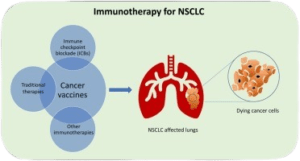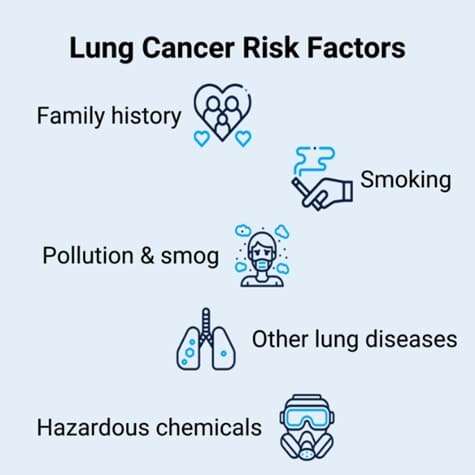Lung Cancer Treatment in India
Every year, millions of individuals throughout the world are affected by lung cancer, one of the most prevalent and deadly types of cancer. Lungs are essential organs for preserving our general health and well-being. Our respiratory system would not function without lungs, allowing us to take in the oxygen required to survive. The effects of lung cancer can be terrible for both patients and their families.
Anybody could be affected by this disease, regardless of age, gender, or way of life. The condition can take a tremendous physical and mental toll, leaving sufferers feeling anxious, unsure, and alone. Families may also experience a significant impact as they strive to support their loved ones while simultaneously coping with their grief and loss.
Both patients and their families may endure major life changes after a lung cancer diagnosis. Our team of highly qualified medical experts is committed to providing patients and their families with compassionate and understanding support throughout this trying journey. Dr. Sridhar PS is among the leading oncologists for people seeking caner Cyberknife treatment in India.
“At our state-of-the-art treatment facility, both as a radiation oncologist in India and a Cyberknife Specialist in Bangalore, India. Dr. Sridhar PS emphasize a holistic approach from diagnosis through treatment and beyond. We are committed to providing comprehensive care and unwavering support to patients and their families navigating the challenges of lung cancer. Every patient, without exception, deserves the highest quality care and treatment, and we are steadfast in delivering just that.”

About lung cancer treatment
The course of lung cancer treatment may change based on the patient’s overall health and medical history, the stage and type of lung cancer, amongst other factors.

Surgery
Surgery entails the removal of all or a portion of the cancerous lung. Lung cancer surgery cost in India ranges from approximately INR 95,000 to as high as INR 3,000,000.
Radiation therapy
High-energy radiation is used to eliminate cancer cells. The afflicted lung region receives radiation therapy, often administered from outside the body (external beam radiation).
Chemotherapy
Chemotherapy for lung cancer entails administering medications that destroy cancer cells all throughout the body. Chemotherapy medications can be taken orally or intravenously, and the procedure can be carried out in cycles spanning a few weeks or months.
Immunotherapy
Immunotherapy employs the patient’s immune system to battle cancer cells. This particular form of targeted therapy aids the immune system’s recognition and elimination of cancer cells.
“One of the best lung cancer treatment plans in India may involve a combination of these therapies or one of them depending on the stage and type of lung cancer,” says Dr. Sridhar PS, a highly-skilled lung cancer specialist in India. “Early diagnosis and treatment are essential for lung cancer patients to have better outcomes and a higher quality of life.”
With his high expertise and knowledge about lung cancer, Dr. Sridhar PS is often lauded as the provider of the best lung cancer treatment in India.
Targeted therapy
Drugs that specifically target malignant cells’ unique abnormalities are used in targeted therapy. These drugs target particular proteins or genes that support the growth and division of cancer cells. Non-small cell lung cancer (NSCLC) with particular genetic alterations is frequently treated with it. Drugs for targeted therapy might be administered intravenously or orally.
Lung Cancer Types and Stages
Non-Small Cell Lung Cancer (NSCLC) and Small Cell Lung Cancer (SCLC) are the two main subtypes of lung cancer. Approximately 85% of lung cancer cases are NSCLC, the most prevalent kind. SCLC is less common and typically progresses more swiftly.
The size of the tumor, whether the disease has migrated to neighboring lymph nodes, and whether it has spread to other body areas, all affect the stage of lung cancer. The lung cancer stages are:
- Stage 0: Stage 0 cancer is limited to the lung’s lining and has not migrated to lymph nodes or neighboring tissues.
- Stage I: The cancer is contained to the lung and has not spread to the lymph nodes or other body organs.
- Stage II: The cancer remains within the lung but has progressed to adjacent lymph nodes or tissues.
- Stage III: The cancer has spread to surrounding lymph nodes, tissues, or nearby organs.
- Stage IV: The cancer has gone to the brain, liver, or bones, among other organs.
The optimal treatment options and the patient’s prognosis are influenced by the stage of the patient’s lung cancer. Typically, chemotherapy, radiation therapy, targeted therapy, and immunotherapy are used in conjunction with surgery for stage 4 lung cancer treatment in India.

Don't Wait for Symptoms: Book Your Lung Cancer Evaluation!
Symptoms

- Longstanding cough, worsening with time or not responding to medication.
- Chest discomfort
- Breathing difficulty
- Wheezing
- Hoarseness
- Coughing up rust-colored or blood-stained phlegm
- Appetite loss and weight loss
- Fatigue
- Persistent lung ailments like pneumonia or bronchitis
Both patients and their families may endure major life changes after a lung cancer diagnosis. Our team of highly qualified medical experts is committed to providing patients and their families with compassionate and understanding support throughout this trying journey. Dr. Sridhar PS is among the leading oncologists for people seeking caner Cyberknife treatment in India.
Diagnostic process for lung cancer
Several tests are generally performed as part of the diagnosis process for lung cancer, including:
Imaging tests: A chest X-ray, CT scan, or MRI may be utilized to obtain images of the lungs and adjacent areas and to find any anomalies.
Biopsy: A tissue sample from the lungs may be obtained either with a needle or during surgery to check for the presence of cancer cells.
Sputum cytology: A sample of lung mucus is scrutinized to detect cancer cells.
Bronchoscopy: A small, flexible tube with a camera may be introduced through the mouth or nose into the lungs to study the airways and gather tissue samples.
“Once we have diagnosed lung cancer, the next step is to determine the cancer stage to help chart the treatment plan,” adds a well-known lung cancer specialist in India Dr. Sridhar PS. “Ascertaining whether the cancer has progressed to other body parts may entail additional imaging tests like PET scans or bone scans.”
Lung Cancer Treatment Cost In India
The lung cancer treatment cost in India can vary widely depending on several factors such as:
- The cancer stage
- The treatment type
- The hospital or clinic of treatment
- The city of the selected treatment facility
- The doctor’s expertise
That said, lung cancer treatment cost in India is relatively low compared to the western countries. It can start from INR 95000 and go up to INR 3000000. On average, the treatment cost, including lung cancer test cost in India is around INR 1350000. This would be the cost of the best possible treatment for your condition, including follow-up care, after diagnosis and medical consultation.
If you or a loved one is living with lung cancer, please get in touch with Dr. Sridhar PS for a proper assessment and estimate of lung cancer treatment cost in India. With over 19 years of an illustrious career in the field of oncology, Dr. Sridhar PS is often called the best lung cancer doctor in India.
Turning Fear into Courage, Doubt into Determination: Discover Hope with Our Lung Cancer Team!
Preventive measures for lung cancer
Researches have revealed that genetic traits can contribute to developing lung cancer, however, air pollution and smoking are the major culprits of lung cancer.
Following are a few precautions that you take to reduce your chances of getting lung cancer:
- Quit smoking
- Avoid exposure to secondhand smoke
- Test your home for radon
- Wear protective gear if your work environment exposes you to asbestos, arsenic, or diesel exhaust
- Follow a nutritious diet rich in vegetables, fruits, and whole grains
- Stay active with regular exercises
Please remember to get regular check-ups with your doctor and to seek medical attention if you notice any symptoms or changes in your health.

FREQUENTLY ASKED QUESTIONS
Depending on the type and stage of the cancer, lung cancer can spread swiftly or slowly. Small cell lung cancer tends to multiply and spread quickly, whereas non-small cell lung cancer can develop more slowly. However, early diagnosis and treatment can increase the likelihood of a remedial course of action and stop the cancer from spreading.
Stage 1 lung cancer is frequently treatable, especially if it is discovered quickly and is surgically treated. In some circumstances, further therapies including chemotherapy or radiation therapy may be suggested. The prognosis, however, depends on the type, general health, and other elements that could influence treatment.
The cancer type, stage, and general health of the patient are among the variables that determine the most effective lung cancer treatment. Early-stage lung cancer is frequently best treated with surgery. However, more advanced patients may benefit from chemotherapy and radiation therapy. Lung cancer may occasionally be treated with immunotherapy and targeted therapy.
Depending on the type and stage of lung cancer, the symptoms in its advanced stages can change. Severe breathlessness, a persistent cough, chest pain, exhaustion, loss of appetite, weight loss, and trouble swallowing are a few common symptoms. Patients may occasionally additionally have delirium, confusion, or other neurological symptoms.
Genomic testing for lung cancer involves analyzing the DNA of tumor cells to identify specific genetic mutations, helping determine personalized and targeted treatment options.


